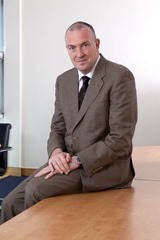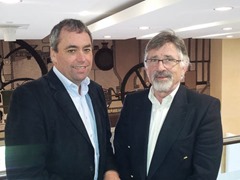A new Veolia model
 A longstanding environmental company is transforming itself to meet the growing pressure on water, energy and raw materials resources.
A longstanding environmental company is transforming itself to meet the growing pressure on water, energy and raw materials resources.
Present today in over 40 countries, Veolia Environnement boasts a 160-year old legacy in supporting the sustainable growth of public authorities and industry through its water, energy and waste management expertise. Under the leadership of Chief Executive Officer, Antoine Frérot, a new Veolia is emerging around the world. The company is reshaping itself from a group organised by divisions, whose water, energy and waste businesses were traditionally “side by side” to an organisation which is fully integrated and structured by country. Integrating the energy, water and waste businesses on a country basis will enable Veolia to respond more efficiently to the specific needs of its clients. Being integrated means being more responsive.
Pat Gilroy, Veolia Country Director for Ireland (pictured) and head of Veolia’s energy business, Dalkia, in Ireland and the UK, explains: “2014 really is a key phase for our organisation internationally and locally and has brought about a greater simplicity and efficiency to what we do. The transition to a country-based Veolia will enable quicker development and deployment of our integrated energy, water and waste innovations to meet the most pressing environmental challenges faced by our clients here in Ireland.”
He sees the new Veolia direction as one which is much closer positioned to the needs of its customers. ‘’Sustainable water and energy management are inextricably linked, the perception of waste has changed completely and Veolia has played its part in that sea change, shifting the business model from waste recycler to a manufacturer within the circular economy.” With Gerry Power and Kieran Mullins leading the company’s water and waste activities respectively, the new Veolia is well placed to harness the combined knowledge and experience of the Irish energy, water and waste environment while drawing on the company’s extensive innovation and research capability.
The real cost of water
Cost-effective sustainable management of water throughout the production process is a key challenge facing industry and public water utilities today.
Process water and wastewater are key economic components to be managed, especially in the food and beverage, ICT and pharmaceutical industries. The National Competitiveness Council has found that industrial water costs in Ireland are the fifth highest of 16 countries in the euro area. Furthermore it is unclear what impact the establishment of Irish Water will have on industrial water costs – the potential harmonisation of tariff structures across the country could be a real challenge for companies, depending on location. Additionally, companies must ensure that their industrial wastewater complies with the relevant IPPC and discharge licenses, not to mention corporate and global environmental targets.
In an increasingly environmentally sensitive marketplace, water is seen as a strategic asset which needs to be managed appropriately. This reality has prompted Veolia to develop a new metric to help industry and local authority alike to grasp the obvious and hidden cost of water so they can make sustainable business decisions while ensuring long-term profitability.
The ‘true cost of water’ tool combines traditional capex and opex calculations with analysis of water risks and their financial implications, to ensure that optimal investment and operational decisions are taken over the lifetime of a plant. Veolia’s analysis and recommendations are tailored to the specific client environment. The tool has universal application for all major water users, from food and beverage to pharmaceutical manufacturers and from public water authorities to oil and gas companies.
Whether recommending hydrocarbon sensors on process water to protect a product line or installing CHP to create energy self-sufficient waste water treatment plants, Veolia’s core business is rooted in its understanding of the water-energy nexus and finding ways to reduce the environmental and economic impact of this vital interdependency.
Turning waste into a resource has been a long-term strategy of Veolia’s waste business and it continues to take the model further by pioneering technology which changes how we define waste. Instead of just looking at how to handle or treat waste, Veolia is now focusing on what it can manufacture from waste streams and in doing so plays a vital role in the circular economy. Already in Ireland, Veolia’s core expertise in the treatment of hazardous waste materials from industry has opened up a sustainable alternative fuel supply to one of the country’s leading cement manufacturers.
This Secondary Liquid Fuel (SLF) can replace fossil fuels used in cement kilns. Another innovation that Veolia has developed in Ireland is the use of industrial sludges as a replacement raw material in the cement manufacturing process. This benefits the environment by reducing the amount of natural resources being used in the cement industry leading to a more sustainable product.
A major Irish food manufacturer is benefitting from a Veolia solution which transforms its phosphorous by-product into a reusable resource for agriculture while in Belgium, the North Brussels sanitation site was chosen for the implementation of the first prototype testing to recover organic matter from municipal wastewater for conversion into valuable end-products – bio-plastics from wastewater sludge. These are just a few examples of how industrial and municipal by-products can yield financial and environmental benefits. Veolia is helping clients to identify these opportunities on a daily basis.
Energy leadership
In the area of energy, Dalkia has focused on the meeting the needs of its customers through three key activities – industrial utilities, building energy services and district energy.
While all three business lines are active in the Irish market, the industrial utilities activity (which involves the efficient management of all utilities used in industrial production processes, from supply of energy, through distribution of steam and hot water, to plant and equipment maintenance, calibration and reduction of consumption at point of use) is particularly strong in industries such as food and beverages, dairy plants and the pharmaceutical industry.
Dalkia has full-time on-site operation, management and energy optimisation teams on a variety of such customers’ sites with responsibility for reliable, safe and efficient operation of their energy and utilities under a guaranteed performance framework.
Dalkia co-develops solutions with a variety of technologies which best suit the needs of that customer – from new energy centres, incorporating biomass or combined heat and power plants, through plant reliability enhancements, to heating control equipment, to plant reliability enhancements, demand response services, energy efficient lighting and demand response services.
A new ambitious initiative by Dalkia at global level is the Dalkia Energy Savings Centre (DESC) which is an integrated management platform for energy efficiency. The Irish pilot site for DESC is an existing Dalkia client who operates a large multisite healthcare facility in Dublin. A model of the facility or building’s energy performance is created via audit, and then the data is interpreted for a complete understanding of how the building behaves in terms of energy consumption.
Any type of facility can be remotely managed in real time as a complement to Dalkia’s onsite presence. This comprehensive data analysis supplements the technical knowledge from the field to help our clients make the right investment decisions to enhance energy performance.
Finding solutions to the most complex environmental challenges is both a core component of Veolia’s business lines and a major global challenge. Resource scarcity is at the heart of these challenges but is being viewed by Veolia as an opportunity to invent a new economic and social development model that is more efficient and balanced.
By constantly innovating in order to design and deploy a comprehensive array of resource‐based solutions, the new Veolia aims to fulfil its ambition to support the environmental, economic and social development of industry and vital public services to ensure a more sustainable future for all.
 To find out more, contact Declan White at:
To find out more, contact Declan White at:
Tel: +353 (0)56 776 3950
Mobile: +353 (0)87 982 4467
Web: www.veolia.ie
Email declan.white@veolia.com






